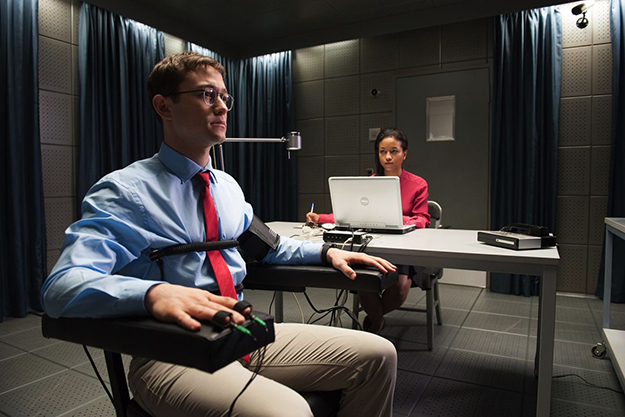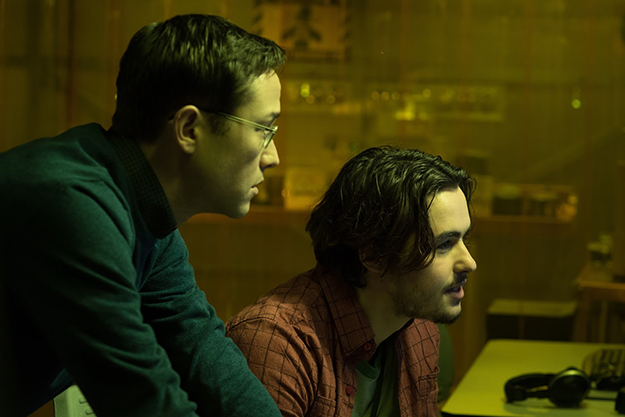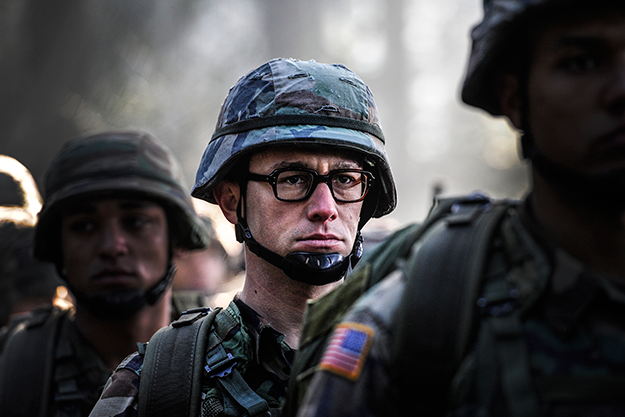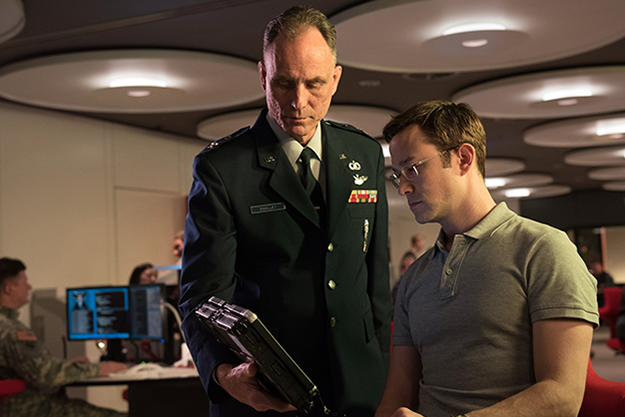Deep Focus: Snowden

At the risk of comparing an apple or an orange with a rotten tomato, John Oliver’s interview with Edward Snowden on Last Week Tonight a year and a half ago dwarfs Oliver Stone’s biopic Snowden in incisiveness, creativity, and revelation. John Oliver, you may recall, traveled to Russia to interview “the most famous hero and/or traitor” of our time about releasing 1.7 million super-confidential documents that revealed the National Security Agency’s unprecedented surveillance of American citizens and civilians worldwide. The host of Last Week Tonight compelled the former NSA contractor to discuss how he merely “evaluated,” but did not read, all the data he dumped, then relied on journalists to read and release them with proper caution. (One result: an inept New York Times redaction betrayed details of the U.S. monitoring Al Qaeda in Mosul, a seedbed for Isis.) Snowden expressed the belief that his bold act catalyzed a universal debate over our rights to privacy. Oliver acknowledged that he had changed the way intelligent humans look at the basic building blocks of our information society—our phones and tablets and computers. The comic then played Snowden a string of interviews with typical citizens who didn’t recognize his name or, worse, confused him with Julian Assange of WikiLeaks.
Oliver wasn’t posing as a prosecutor. He was performing as a blend of honest information-broker and savvy comedian, striving to make sense of Snowden’s disclosures in a nonsensical political world. Snowden appeared to appreciate the air-clearing. By the end of the segment, Oliver got him to agree that Americans, by and large, did not care about the U.S. scooping up information in foreign lands, and would be concerned about the NSA spying on Americans only if they knew that the agency was capable of snatching up “dick pix.” Oliver then handed over a picture of his own junk and methodically quizzed Snowden on the different programs that would enable the NSA to acquire our most intimate matters. The result was the most lucid explanation available of Section 215 of the Patriot Act and Executive Order 12.333 in action, tracing specifically how data-devouring schemes like PRISM, MYSTIC, and Upstream could grab a man’s picture of his package.
Oliver, still only 39 himself, liberated Snowden from the hagiographic glow that had surrounded him in Laura Poitras’s Citizenfour, allowing us to see him as a young man (now 33) who may not have been fully formed when he stole and redistributed all those digital files in 2013. Oliver Stone restores the halo in Snowden, a pedestrian rendering of Snowden from early adulthood to the present day, when, in a secular sort of sanctified exile, the real Snowden emerges to celebrate the new life he’s created for himself for Russia. He sports a grin that feels wan and fake compared to his disarmed and disarming smiles on Last Week Tonight. (The John Oliver piece trenchantly depicted Russia as a place that can make you nervous or paranoid when an interview subject is less than an hour late.)

For the record, Stone and Kieran Fitzgerald are credited with writing the script from Luke Harding’s 2014 The Snowden Files and a Russian novel Time of the Octopus, by Snowden’s sometime lawyer, Anatoly Kucherena. But the film comes out as 100 percent unadulterated Stone, complete with the hero’s embodiment of an all-American “innocence” and the loss of that innocence at the hands of manipulative and paternal authority figures. Instead of Born on the Fourth of July, we get Reborn after 9/11.
Stone has no interest in portraying Snowden as a one-man geek squad—unlike Harding, who bases the early part of his book on postings that Snowden wrote in the online persona, “The True HOOHA,” for the technology website Ars Technica. To Harding, Snowden’s chat logs “form a Bildungsroman, a novel of youthful experience, written by someone from the first generation that grew up with the internet.” (The Japanese video game Tekken not only consumed him but influenced his moral outlook with its vision of “an everyman warrior battling evil.”)
Snowden posted as The True HOOHA from December 2001 through May 2012, expressing his support of Ron Paul’s candidacy for president, his hatred of government leakers (!), his defense of the Iraq War, and his aggressive advocacy of libertarianism. He was an opponent of social security and a zealot for gun rights. As The True HOOHA, Harding writes, Snowden would “cover a colorful array of themes: gaming, girls, sex, Japan, the stock market, his disastrous stint in the US army, his impressions of multi-racial Britain, the joys of gun ownership (‘I have a Walther P22. It’s my only gun, but I love it to death,’ he wrote in 2006).”

Stone, like many a filmmaker before him, either has no idea of how to dramatize a life spent on the Internet or no comprehension that capturing a particular kind of heightened Web consciousness is key to the success of his movie. (He tosses in Snowden declaring his devotion to Ayn Rand, Joseph Campbell, George Lucas’s Star Wars, and anime, with little impact.) Stone competently re-stages the events covered in Laura Poitras’s Citizenfour—documentary filmmaker Poitras (Melissa Leo), radical Guardian columnist Glenn Greenwald (Zachary Quinto), and Guardian political reporter Ewen MacAskill (Tom Wilkinson) interviewing Snowden (Joseph Gordon-Levitt) in his Hong Kong hotel room, then helping him execute his disclosures. But the movie begins to feel soggy as soon as Stone starts flashing back to the sufferings of young Edward as he discovers the cruelties and amorality of spy-craft and surveillance. You can’t help thinking that he might not have been so shattered if he’d read some John le Carré or Graham Greene in between The Fountainhead and Atlas Shrugged.
In the first of many flashbacks, Stone puts his emotional force behind Snowden’s early efforts to enlist in the U.S. Army Reserves and train as a Special Forces candidate. He soon discovers that his slender frame isn’t built for the job: he gets discharged after suffering two broken legs. But before that happens, Stone intersperses elegiac shots of recruits quick-marching through the brown-green Georgia countryside outside Fort Benning with overhead shots of the men looking like a human insect swarm, in frames that have the color leached out.
That’s Snowden’s destiny in a nutshell. He flits from one government agency or contracting job to another, moving upward but growing paler and more disenchanted by the nanosecond. It’s supposed to be hip and funny that he and his girlfriend, Lindsay Mills (Shailene Woodley), strike digital sparks when they learn, in a geek chat room, that each loves the 1995 anime Ghost in the Shell. Later, during a walk in Washington, D.C., Snowden gets smitten when he learns that she can track down an IP address. But the way Stone has shaped the story, Snowden is just a clean-cut, old-fashioned conservative who believes that an individual can make a difference—or perhaps, that only an individual can make a difference. Stone underplays what historian Sean Wilentz has called Snowden’s “paranoid libertarianism,” which included proselytizing for a return to the gold standard. In the film he’s simply caught between forward-thinking, war-protesting Lindsay, a photographer, blogger, and pole-dancing instructor (sometimes, apparently, all three at the same time), and his CIA mentor, Corbin O’Brian (Rhys Ifans), who is so appreciative of Snowden’s supposed genius that he keeps offering him inside jobs or smoothing his way with private contractors and agency vetters.

What many Americans wanted to know when Snowden’s revelations broke was whether he was a phenom highly placed in the security establishment or a lowly office drone who was in the right spot at the right time to natch files from top-secret servers. Stone portrays him as both: a budding technocrat so brilliant that O’Brian put him on the fast track in America’s security system, thus enabling Snowden to position himself superbly as a spy. It’s as if he’s living out a nerd’s version of How to Succeed in Business Without Really Trying, though there’s nothing comic or musical about it. Stone’s hangdog evocation of Snowden’s alienation imbues the film with a depressive singsong rhythm.
This globe-hopping movie touches down in spots as picturesque as Geneva and Oahu, and contains action that’s potentially charged, like the CIA framing a banker to turn him into a stoolie. But the dramatic arc is limp. The movie putters along until our hero reaches his breaking point. That comes when O’Brian questions Snowden about his loyalty via a huge long-distance video-call screen. The CIA honcho demonstrates that he’s been spying on the contractor so closely that he can tell when Snowden is musing at a backyard cookout about Lindsay’s faithfulness. O’Brian assures Snowden that she hasn’t slept with another man. In this movie, that’s the final straw for Snowden. It isn’t far removed from John Oliver’s view that what Americans really hate is the government looking at their privates. But Last Week Tonight did a better job of bringing home the vast implications of Snowden’s actions, revealing the way they altered our consciousness of the digital ether we all breathe. Snowden is mostly about canonizing Snowden.
Nicolas Cage hams it up enjoyably as a resigned CIA rebel who delights in Snowden’s actions from afar, and Ben Schnetzer is perfect—smarmy and funky—as Gabriel, the breezy coworker who introduces Snowden to the global data-snatcher XKeyscore. Schnetzer’s performance is so evocative that we feel we know all about Gabriel simply by watching him work a computer. We imagine him crashing at home, flopping into bed, surrounded by candy wrappers and Diet Coke cans. But Levitt, as Snowden, proves the limits of a documentary impersonation approach. Hewing close to filmed records of the man without imagining what might be going on beneath his skin, Levitt goes “full Snowden,” and comes off as a mildly temperamental droid. Levitt gives Woodley nothing to bounce off; she turns Lindsay into a figure that’s alternately banal and baffling.

Stone’s own presence as a director is oppressive. It’s as if he’s phoning it in from O’Brian’s video-call system, with big, obvious touches that might be confused with mastery. Even his splashier techniques, like the shifts in focus when Snowden fades in and out of consciousness during an epileptic attack, were used more eloquently in The Maltese Falcon 75 years ago. Awkward and sprawling, Snowden is 102 minutes longer than John Oliver’s Snowden/government surveillance episode. But the news-comedy show was smarter, more involving, and even a more satisfying visual experience than this sullen, self-important movie.
Michael Sragow is a contributing editor to Film Comment and writes its Deep Focus column. He is a member of the National Society of Film Critics and the Los Angeles Film Critics Association. He also curates “The Moviegoer” at the Library of America website.







